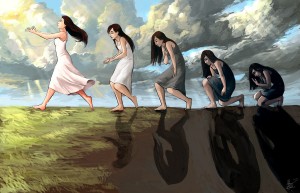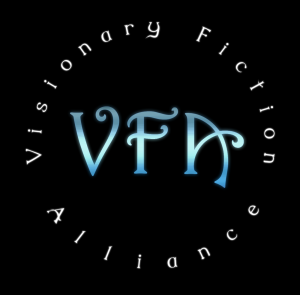Visionary Fiction Challenges Our Species to Evolve
31 Aug 2012 2 Comments
in Books, Writing Tags: climate change, Crashing Eden, human evolution, population explosion, science fiction, Visionary Fiction
(The original post of this article can be found at: VisionaryFictionAlliance.wordpress.com)
Human nature is not fixed. It has evolved over the course of millennia and is capable of further change. Is it overly grandiose to suggest that visionary fiction could help play a role in such a transformation?
Most likely, but I shall nevertheless make the case.
Visionary fiction overlaps with several better established genres, such as science fiction, fantasy, speculative, and inspirational fiction. What’s unique about visionary fiction is its focus on the expansion and evolution of the human mind, imagining new frontiers for the human spirit.
What’s the importance of visionary fiction in today’s world?
There is no denying that we live in an era of unprecedented change and extraordinary uncertainty about the future. It’s the Age of Crises. Population explosion, pollution, natural disasters, climate change, economic recession, scarcity of resources, terrorism, and ethnic wars all threaten to disrupt or end civilization as we know it.
Perhaps science and technology can help solve some of these dilemmas. But even the most astonishing technological breakthroughs will not save us if they are not accompanied by a transformation in how we think, act, and relate to each other.
Just as science fiction has furnished the inspiration for many technological advances, it’s conceivable that visionary fiction could help provide the inspiration for a new awakening of the human spirit.
For it is now evident that it’s the shortsighted, self-centered, greedy, and xenophobic aspects of human nature that have created our predicament. Only by evolving into a wiser, more generous, compassionate, and cooperative species can we hope to survive.
My novel, Crashing Eden, envisions a world in which humans are transformed by regaining the capacity to hear the primordial vibration of the universe, reestablishing Edenic consciousness. This may be pure fantasy, but unless we can manage to overcome our differences and think on a planetary scale, our future may well be bleak.
Visionary Fiction Alliance website goes live!
20 Aug 2012 1 Comment
in Books Tags: article on Visionary Fiction, Book Giveaway, new website, VFA, Visionary Fiction, Visionary Fiction Alliance
Here’s the cool logo of the newly formed Visionary Fiction Alliance, of which I’m a founding member.
A handful of authors met at the Goodreads Visionary Fiction Group and we started a web ring in order to promote interest in visionary fiction. Our new blog went live on August 17th, and will serve as a resource for readers, authors, agents, reviewers, and publishers. I’m excited to be a part of this undertaking.
To celebrate the launch of the VFA, we’re offering a chance to win seven VF titles from our founding members. You can enter the giveaway through the end of August.
You can also check out my new article—Visionary Fiction Challenges Our Species to Evolve—which has been posted on the VSA site.
We each contributed a “blog blessing,” as well, and here’s my little ditty:
May the VSA
Inspire today
And foreshadow
A better tomorrow.
What is Visionary Fiction?
28 Mar 2012 21 Comments
in Writing Tags: Crashing Eden, literary genres, new age, spirituality, Visionary Fiction
When I first heard the term visionary fiction, what came to mind were such literary giants of the past as Dante, Milton, Goethe, Blake, and Whitman. Each of these authors bent toward the future, envisioning a human race struggling to evolve toward a higher spiritual plane.
Two of my favorite twentieth century writers, Nikos Kazantzakis (Zorba the Greek, Saint Francis, The Last Temptation of Christ) and Hermann Hesse (Siddhartha, Narcissus and Goldmund, Steppenwolf, The Glass Bead Game) were firmly in this tradition. Their novels portray protagonists who are striving to reach a more enlightened state of being.
Only recently have I discovered that visionary fiction is resurfacing as a “new” literary genre. In collaboration with fellow authors Shannon Sinclair, Jodine Turner, Saleena Karim, and Sandy Nathan, I’ve joined a Visionary Fiction Web Ring, and invite other novelists to become involved.
So what exactly is visionary fiction?
Perhaps the most cogent answer I’ve come across is from author Michael Gurian, who defines the genre as “fiction in which the expansion of the human mind drives the plot.”
According to Gurian, what moves the story along in visionary novels are such things as visions, hallucinations, mystical experiences, paranormal abilities, channeling, precognitive dreams, eerie coincidences, profound insights, and a feeling of being “utterly at one with the world.”
Visionary fiction overlaps with several better established genres, such as science fiction, fantasy, magical realism, and new age fiction. What seems to be unique about visionary fiction is its focus on the expansion and evolution of the human mind, imagining new frontiers for the human spirit.
Although I didn’t set out to write visionary fiction, my forthcoming novel—Crashing Eden—seems to meet all of the relevant criteria. Still, the story ultimately defies categorization in that it can also be read as a tongue-in-cheek send-up of both organized religion and new age mysticism.
The last word goes to that quirky comedian and philosopher, Steven Wright, who said: “I was a peripheral visionary. I could see the future, but only way off to the side.”


Recent Comments